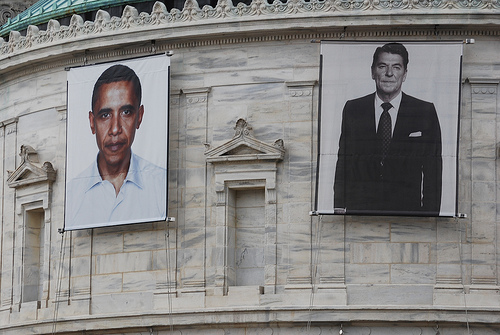For the second time in four years the U.S. electorate has voted against neoliberalism. The scale and the meaning of the victory has been underestimated as conservatives and liberals alike emphasize the vote count for the Democrats and the Republicans. Roughly 61,900,000 people voted for Obama and 58,650,000 chose Romney. The apparent proximity of these numbers should not obscure other understandings of the victory.
First, Obama resoundingly won the Electoral College vote. In the U.S. system there are 538 Electoral College votes that are apportioned to various states on the basis of their population. For example, California is the most populous state in the United States and holds 55 Electoral College votes, more than any other state in the country. In general — apart from a few exceptions — when a candidate wins the highest percentage of the votes in a state, then he or she wins all of its Electoral College votes. In Canada the emphasis is on prevailing in each riding so as to accumulate a majority of the seats in Parliament; in the U.S. the stress is on winning each state in order to accumulate a majority of the Electoral College votes. In 2008 Obama won 365 Electoral College votes while in 2012 — after four years of minimal success against the worst economic crisis in 70 years — Obama won 332. The only states that he lost — in comparison to his winning coalition of 2008 — were two traditionally Republican states: North Carolina and Indiana. To highlight the significance of Obama’s numbers one can compare them to George W. Bush’s victories: in 2000 Bush won 271 Electoral College votes and in 2004 he garnered 286. Obama’s victory was decisive and far more impressive than the credit it has received from either side of the political spectrum.
Second, Obama won for different reasons than those that are being generally publicized. The day after the election, Joel Benenson, Obama’s chief campaign pollster, noted in an op-ed article in the New York Times that “Values, Not Demographics, Won the Election.” Benenson pointed out that the mainstream media interpretation of the U.S. election results focused on the continuing strength of President Obama’s 2008 coalition — minorities, women and young people. The pollster noted that this analysis conceals the significance of the election: the race was not primarily shaped by the Democrats’ technocratic skill in incorporating Latinos or any other group into their voting pool but instead by the public’s preference for the values articulated by the President. Obama’s coalition held on despite dismal employment numbers, controversies around his health-care plan, and the continuous, well-financed criticism that he has faced from right-wing social movements because the majority of voters believed in Obama’s Keynesian or statist economic policies as opposed to the Republicans’ free market ones.
Benenson points out, surprisingly, that Obama’s victory ultimately rested on the public’s trust of his economic stewardship rather than that of Romney. Voters stated that their top two worries about Romney were first, that “he won’t do enough to restore security for working- and middle-class families” and second, “he won’t do enough to ensure that Wall Street and big corporations have to play by the same rules as everyone else.” As well, only 18 per cent of voters strongly agreed that “the middle class always does well when big corporations do well.” These sentiments reveal that the majority of American voters were not simply rejecting Romney, but more profoundly refuting the economic policies that have characterized the Republican Party since 1980. President Obama’s victory was not just over Mitt Romney but more importantly over the neoliberal vision; the 2008 victory indicated that the majority of the public had lost confidence with the Republicans’ economic stewardship. The 2012 victory goes much further because it reveals that the public is disillusioned with the conservatives’ economic ideology.
Third, the victory guarantees that the termination of Reaganism will be institutionally consolidated by the President’s health-insurance plan which can now be fully implemented without risk of Republican repeal. The Nobel Prize-winning economist Paul Krugman has stated that the plan will provide affordable insurance to 30 million Americans who have never had access to proper health care. In addition to these 30 million there will also be millions of other beneficiaries, such as those who were at risk of losing their employment as well as those with pre-existing conditions who had previously been denied coverage in many areas of the U.S. The young and old recipients of “Obamacare” will let go of conservative economic notions as they experience the benefits of increased state co-ordination of health care.
To conclude, there is no doubt that Obamacare can be vastly improved and there is little question that President Obama’s policies in general — especially in terms of poverty alleviation, environmental protection and militarism — should be substantially altered. Activists will need to keep campaigning for better proposals and more funding — especially in terms of health care. These challenges however should not blind us to the meaning of the 2012 election: President Obama has not only defeated Mitt Romney but more profoundly has ended the long night of neoliberalism. This triumph — supported by minorities, people of colour, liberal women and men, LGBTQ communities, unions, environmentalists, progressive religious folk, young people, radicals and reformers — opens up the horizon of possibilities in terms of more innovative, far-reaching and effective proposals.
Photo: Adam Fagen/Flickr
Thomas Ponniah was a Lecturer on Social Studies and Assistant Director of Studies at Harvard University from 2003-2011. He remains an affiliate of Harvard’s David Rockefeller Center for Latin American Studies and an Associate of the Department of African and African-American Studies.



